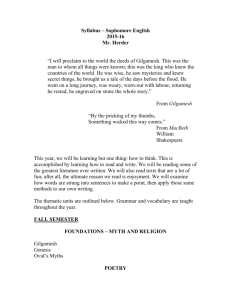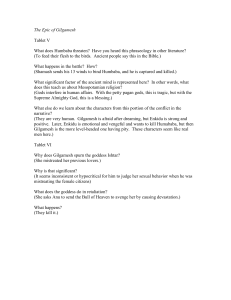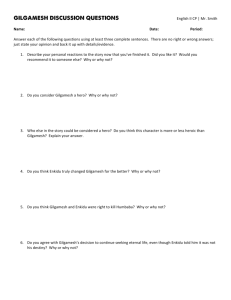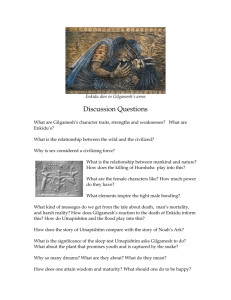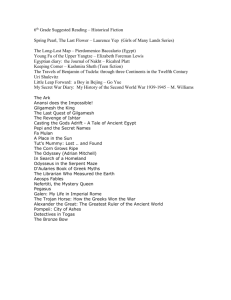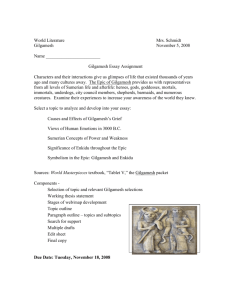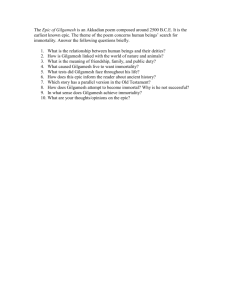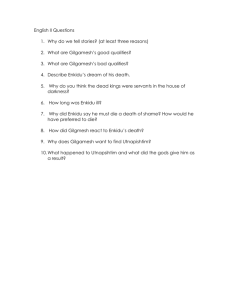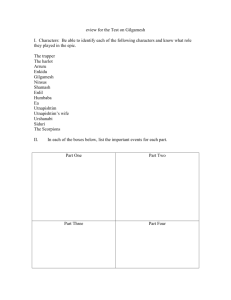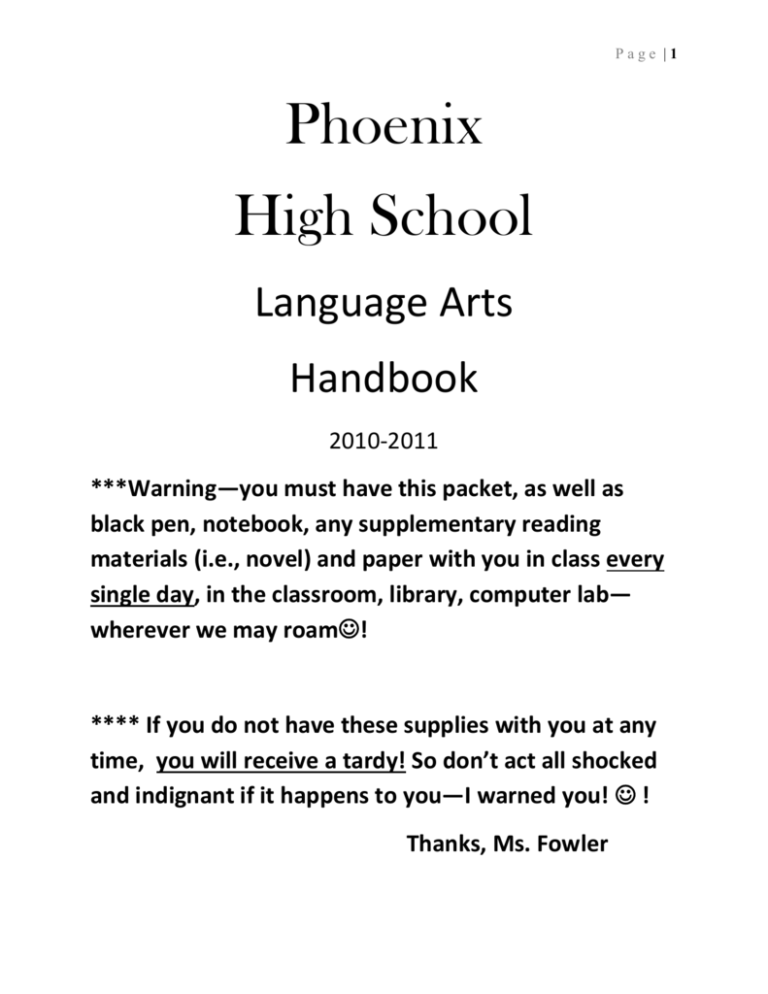
Page |1
Phoenix
High School
Language Arts
Handbook
2010-2011
***Warning—you must have this packet, as well as
black pen, notebook, any supplementary reading
materials (i.e., novel) and paper with you in class every
single day, in the classroom, library, computer lab—
wherever we may roam!
**** If you do not have these supplies with you at any
time, you will receive a tardy! So don’t act all shocked
and indignant if it happens to you—I warned you! !
Thanks, Ms. Fowler
Page |2
Table of Contents
1. “Why do we write on literature?”--3
2. MLA Student Title Page (Model)--4
3. Works Cited (Model)—5
4. New MLA Citation Rules and Model s—6
5. Where do I find the citation info in a book?—13&14
6. How to introduce quotes and paraphrases—15
7. Model Essay (complete with Works Cited)—16
8. More info on parenthetical citation (the stuff that goes in the
parentheses)—21
9. Citing a poem or song—22
10. Block Quotes—22
11. How to cite a play—23
12. Transitions—24
13. How to write a critical review—25
14. Where do I go for help?—26
15. Library Project (Model)--28
Page |3
Why Do We Write on Literature?
This is a question students always seem to ask. Teachers in my own past never really
answered it to my liking. They would sometimes attempt to answer, “because it makes you
smart,” but this response told us little. Or, in annoyance they would answer, “because this is
an English class,” which told us nothing at all and only brought us to the question “Why do
we have to take English classes?” So, I always try to do better when I am asked, now that I
am a teacher.
I believe we read literature to discover ourselves, the way we work, as individuals,
as human beings. And we write about literature to come to terms with this new, strange
knowledge. Literature is nothing else but a record, a mirror of ourselves, our behaviors,
motivations, our quirks, insecurities, defeats; it is also full of our triumphs, reconciliations,
and ultimately our redemption. Through literature, we learn to look at our lives
symbolically, to react to conflict, to find our own resolutions just as the characters do in the
fictional stories we read. Thus we become schooled at reading between the lines. These are
some of the reasons Shakespeare has endured; his plays tap into that which is universal,
timeless. We enjoy his work as grand entertainment, but we also somehow see that he is
holding our own face to the mirror and not letting us look away. Like it or not, we, as a
flawed race, need such sublimation, and deep down we know it. So we read, we watch, we
relate, and hopefully, we learn.
Most of us spend our lives trying to understand those universal, but yet personal
questions—who are we? What is our purpose here on earth? Literature allows us to step
back from the intimacy of our own lives and become the observer, the student of life. We
are able to search for these answers through the experiences of those who populate the
pages of fiction, the lines of poetry.
To me, literature’s greatest gift is that it teaches us how to analyze our own lives. If
we can read a story and understand (and analyze why a character behaves in a certain way
or why a certain series of events place a character in an impossible situation, we learn. We
begin to understand those around us better; we also gain a deeper understanding of
ourselves.
Literature allows us to become analytical thinkers and to stop asking others to give
us answers we should find on our own. There are always others out there wishing to
provide all the answers, usually for their own benefit. In the early 1800’s, William Blake
talks about how, throughout history, those who will not think for themselves have been led
to the slaughter like lambs. If you are willing to be told what to think, someone will always
oblige. By learning to find meaning in literature, we can thus learn to transfer this skill and
better understand the events in our own lives. Our mind becomes trained to see through all
the smoke and mirrors.
The true analytical reader/writer/thinker is not a follower. He/she is not that
passive, and instead, seeks the adventure of being a leader. True, this path is not for the
lazy, but it is infinitely more fulfilling.
Page |4
(MLA Student Model)
Alawabdy 1
Alexandra Alawabdy
Fowler
Essay on The English Patient
Senior English II
26 April 2004
Women’s Roles in The English Patient
When war covers the world in a blanket of bloodshed and destruction, beautiful emotions
sometimes blossom out of the pile of ash that comes from burned gardens, shrapnel filled trees,
and ruined sanctuaries. Emotions develop that place an emphasis on love, which allows
boundaries to be crossed and desires to be fulfilled. Passions erupt inside the heart, which lead
humans to satisfy needs of intimacy and companionship by releasing all inhibitions. Among
many other complicated storylines, The English Patient is a portrayal of two women who fulfill
their needs by crossing boundaries in a male dominated society. Ondaatje examines the rolls of
death, abortion and adultery to convey that certain issues must be addressed. Through conflict,
theme and characterization, Ondaatje portrays Hana and Katharine as strong independent women
who represent various faces of feminism as they struggle with controversial issues such as death,
abortion, and adultery, and ironically, the co-dependence of the men around them.
Through several conflicts, both external and internal, Ondaatje describes the important
struggles that Hana encounters. Only a young woman, Hana commits herself to the slavery of
war…
Page |5
Page |6
(Model Works Cited)
Works Cited
Bolland, John. ‘The English Patient’: A Reader’s Guide. New York: The Continuum International
Publishing Group Inc, 2002. Print.
Emery, Sharyn. "'Call Me by My Name': Personal Identity and Possession in The English Patient."
Literature Film Quarterly 28.3 (2000): 210-213. Rpt. in Contemporary Literary Criticism. Ed.
Janet Witalec. Vol. 180. Detroit: Gale, 2004. Literature Resources from Gale. Web. 24 Feb.
2010.
Gilbert, Sandra and Susan Gubar. The Madwoman in the Attic: The Woman Writer and The Nineteenth
Century Literary Imagination. New Haven: Yale University Press, 1979. Print.
“Michael Ondaatje 1943.” Rpt. in LitFinder. Ed. Sharon Smith. Vol 2. Literature Resource Center. Web.
28 April 2004.
Millett, Kate. Sexual Politics. New York: Doubleday and Company, 1970. Reproduced in Sunshine
Books for Women. Web. 26 April 2004.
Ondaatje, Michael. The English Patient. New York: Vintage International, 1992. Print.
Spacks, Patricia Meyer. The Female Imagination. 1975. Creative Quotations Online. Web. 26 April 2004.
Page |7
The New and even more fun MLA Citation Rules!!!
Source of this info:
Delaney, Robert. “MLA Citation Style.” Long Island University, 2010. Web. 31 March
2010.
FYI--http://www.liu.edu/CWIS/CWP/library/workshop/citmla.htm
**********************************************************************************
Image or article from Website
(With an author or creator)
Smith, Fred. “Spock on the Ship, Image.” Star Trekkies Rule the World, 2009. Web.
12 Feb. 2010.
(without an author or creator)
“Spock on the Ship, Image.” Star Trekkies Rule the World, 2009. Web.
Page |8
12 Feb. 2010.
Song from an album
Kilcher, Jewel. “Amen.” Pieces of You. By Jewel Kilcher. A&R, 1994. CD.
Painting from Website
(with an author or creator)
Nerdboy, Festus. Spock Reclining on Chair, 2008. Star Trekkies Rule the World, 2009. Web. 31 Mar. 2010.
Journal Article
[Hardcopy]
Devine, Patricia G., and Steven J. Sherman. "Intuitive Versus Rational Judgment and the Role of
Stereotyping in the Human Condition: Kirk or Spock?" Psychological Inquiry 3.2 (1992): 153-59.
Print.
[From a Website]
Hodges, F. M. "The Promised Planet: Alliances and Struggles of the Gerontocracy in American Television
Science Fiction of the 1960s." Aging Male 6.3 (2003): 175-82. Web. 18 Feb. 2010.
[From a Database]
Roberts, Robin. "Performing Science Fiction: Television, Theater, and Gender in StarTrek: The
Experience." Extrapolation 42.4 (2001): 340-56. Literature Resource Center. Web. 25 Feb. 2010.
Page |9
Newspaper Article
[See examples under "Journal Article" to add the information for the website and database
versions of a printed article]
Di Rado, Alicia. "Trekking through College: Classes Explore Modern Society Using the World of Star
Trek." Los Angeles Times 15 Mar. 1995: A3+. Print.
[Specialized article: Movie review - the review information can be replaced with Editorial, Letter, etc.]
Dargis, Manohla. "Kids in Space." Rev. of Star Trek, dir. J. J. Abrams. New York Times 8 May 2009, sec. C:
1+. Print.
[Material available only on the website and not in the print version]
Lyall, Sarah. "To Boldly Go Where Shakespeare Calls." New York Times. New York Times, 27 Jan. 2008.
Web. 25 Feb. 2010.
Magazine Article
[See examples under "Journal Article" to add the information for the website and database
versions of a printed article]
[See examples under "Newspaper Article" for specialized articles and web-only material]
Mershon, Donald H. "Star Trek on the Brain: Alien Minds, Human Minds." American Scientist Nov.-Dec.
1998: 585. Print.
Book (you know, those heavy things in the library!)
[Hardcopy]
Okuda, Michael, and Denise Okuda. Star Trek Chronology: The History of the Future. New York: Pocket,
1993. Print.
P a g e | 10
Dictionary Entry
“Obviate.” Merriam – Webster’s Collegiate Dictionary Eleventh Edition. 2003. Print.
[No author or editor]
Vulcan Reflections: Essays on Spock and His World. Baltimore: T-K Graphics, 1975. Print.
[From a Database or Website]
Anijar, Karen. Teaching Toward the 24th Century : Star Trek as Social Curriculum. New York: FalmerTaylor, 2000. Ebrary. Web. 1 Mar. 2010.
Book Article or Chapter
James, Nancy E. "Two Sides of Paradise: The Eden Myth According to Kirk and Spock." Spectrum of the
Fantastic. Ed. Donald Palumbo. Westport: Greenwood, 1988. 219-23. Print.
Encyclopedia Article
[Widely used general reference books - Hardcopy]
Sturgeon, Theodore. "Science Fiction." The Encyclopedia Americana. International ed. 1995. Print.
[Specialized reference books - from a Database]
Barr, Marleen S. "Science Fiction." New Dictionary of the History of Ideas. Ed. Maryanne Cline Horowitz.
Vol. 5. Detroit: Scribner's, 2005. Gale Virtual Reference Library. Web. 1 Mar. 2010.
P a g e | 11
Gale Reference Book (and Literature Criticism Online database)
[For books featuring reprinted articles. This shows a magazine article. Use the journal,
newspaper, or book article styles as needed.]
Shayon, Robert Lewis. "The Interplanetary Spock." Saturday Review 17 June 1967: 46. Rpt. in
Contemporary Literary Criticism. Ed.Sharon R. Gunton. Vol. 17. Detroit: Gale, 1981. 403.
Literature Criticism Online. Web. 1 Mar. 2010.
Websites
Epsicokhan, Jamahl. "Confessions of a Closet Trekkie." Jammer's Reviews. n.p., 20 Feb. 2004. Web. 15
Mar. 2010.
[Page with a corporate author]
United States. National Aeronautics and Space Administration. Jet Propulsion Laboratory. "Mission
Could Seek out Spock's Home Planet." PlanetQuest: Exoplanet Exploration. NASA, 10 May 2007.
Web. 15 Mar. 2010.
[Page with no author]
"The Roddenberry Legacy of Human Potential: If Only, If Only." Star Trek Official Site. CBS Studios, 24
Oct. 2007. Web. 15 Mar. 2010.
Blog
Zompist. "Star Wars: Hope Not So New Anymore." Zompist's E-Z Rant Page. WordPress.com, 30 Sept.
2009. Web. 16 Mar. 2010.
P a g e | 12
[Comment posted on a blog or webpage]
Rachael. "Re: Confessions of a Closet Trekkie." Reply to Jamahl Epsicokhan. Jammer's Reviews. N.p., 5
Aug. 2009. Web. 25 Mar. 2010.
Wiki
"Cultural Influence of Star Trek." Wikipedia: The Free Encyclopedia. Wikimedia Foundation, n.d. Web. 15
Mar. 2010.
Internet Video
Crusade2267. "For The Uniform: One Fan's Obsession with Star Trek,Part 1." The Warped Mind of a
Crazy Trekkie: Crusade2267's Channel. YouTube, 2 Nov. 2006. Web. 16 Mar. 2010.
Schnell, Jason, dir. "Twilight Fan: Harry Potter vs. Twilight." Reckless Tortuga's Channel. YouTube, 8 June
2009. Web. 16 Mar. 2010.
[Clip from a movie]
"Star Trek 2009 Deleted Scene with Nero and Klingons." Dir. J. J. Abrams. Paramount, 2009. On Screen:
Finalfrontier1701's Channel. YouTube. Web. 24 Mar. 2010.
PowerPoint Presentation (and other digital files such as Word documents, PDF, etc.)
Oard, Douglas W. "Bringing Star Trek to Life: Computers That Speakand Listen." U of Maryland. Coll. of
Information Studies, 3 Apr. 2001. TerpConnect. U of Maryland. Office of Information
Technology.
Microsoft PowerPoint file. 21 Mar. 2010.
P a g e | 13
ERIC Document
Fuss-Reineck, Marilyn. Sibling Communication in Star Trek: The Next Generation: Conflicts between
Brothers. Miami: Speech Communication Assn., 1993. ERIC. Web. 15 Mar. 2010.
P a g e | 14
P a g e | 15
P a g e | 16
P a g e | 17
Introducing Quotes and Paraphrases
In formal writing, it is important that you introduce all of your quotes and paraphrases.
By doing so, the writer distinguishes between his/her own material and that of others (critics). In
addition, once a quote has been introduced, given, and cited, it then must be discussed. Think of
a quote sandwich: the “quote” should be sandwiched in the middle of your own words. Never
end a paragraph with a direct quote in the analytical section of an essay.
There are several ways to introduce a quote.
1) As a part of your own sentence:
Larry Smith states that he has “been chasing trains for over three years”
(45). It should be noted that he has lost three fingers and half a foot.
2) With your own sentence and a colon:
One lunatic recounts his favorite past time: “I have been chasing trains for
over three years” (Smith 45). It should be noted that he has lost three fingers
and half a foot.
3) By introducing the author or title followed by a comma:
According to Larry Smith, “I have been chasing trains for over three
years” (45). It should be noted that he has lost three fingers and half a foot.
If the essay or article has no author, introduce it with a general statement or with
the title itself:
According to one author, “Larry Smith is a pathetic idiot” (“Idiots and
Their Hobbies”).
Or:
In the article “Idiots and Their Hobbies,” the author asserts that “Larry
Smith is a pathetic idiot.”
P a g e | 18
Anna Riccetti
Fowler
Gilgamesh Essay
Sophomore English I
15 January 2008
The Rule of Three
The quest for immortality is an age-old one that never seems to lose its appeal. Though it is
common to hear tales about ever-lasting life today, it was also a popular subject of stories for the people
of ancient Mesopotamia. These people are the ones that created the Epic of Gilgamesh, an oral tale that
survived and evolved for centuries. In the story there are obstacles that Gilgamesh must overcome in
order to prove himself as a worthy and powerful role-model. What he might not expect out of his
adventures is the wisdom and experience that comes with defeating monsters and chasing after
immortality. Somewhere in the midst of Gilgamesh’s travels, he learns three lessons: the folly of
arrogance, the responsibility of power, and the acceptance of one’s own mortality.
Gilgamesh is two-thirds god and one-third man, and it is this combination that leads to his
arrogance. He is set apart from other humans because, not only is he a king, but also a ruler who is not
entirely mortal. His supernatural side gives him strength, beauty, and power, yet it is his human nature
that allows him to feel arrogant over these attributes. Gilgamesh is over-confident when he and his friend
Enkidu travel to the cedar forest in order to slay Humbaba, the keeper of the woods. When Enkidu
expresses his fear of the monster Humbaba, Gilgamesh simply responds, “‘Immolation and sacrifice are
not yet for me, the boat of the dead shall not go down, nor the three-ply cloth be cut for my shrouding”’
(16). The self-assured king does not question his resolve in the least, and it also appears that he never
considers the fact that he may die. Once the pair actually encounters Humbaba, the fearful Gilgamesh
P a g e | 19
loses his pride and arrogance and weeps openly, calling out to the god Shamash. He pleads, ‘“O glorious
Shamash, I have followed the road you commanded but now if you send no succor how shall I escape?”’
(16). The way Gilgamesh suddenly changes from arrogant to terrified illustrates how easy it is to fall into
a false sense of security, only to have it ripped away. The cockiness displayed by Gilgamesh and Enkidu
upsets the gods, especially Enlil who knew that Humbaba protected the forest. Jacobson explains, “In
ruthlessly asserting themselves and seeking ever new ways to prove their prowess they have grievously
offended the gods, paying no heed to them whatever.” Enkidu is sentenced to death by the gods for the
crimes he and Gilgamesh committed, and Gilgamesh learns the hard way that arrogance can only lead to
suffering.
Following Enkidu’s death, Gilgamesh becomes obsessed with the idea of eternal life, and he is
told a story that teaches him about the responsibility that comes with power. An ancestor of his named
Utnapishtim gained immortality long ago, and Gilgamesh travels to him, all the while hoping to find out
the secret to an eternal existence. Instead, Utnapishtim recites the tale of the flood, and how the gods grew
tired of the noise made by the many humans. Finally, the immortals came up with a solution, and the
tension thickens as the narrator discloses, “So the gods agreed to exterminate mankind” (21). A great and
terrible flood soon encompassed the world, and it was so frightening that even the supernatural beings
responsible hid in the highest heaven. As the gods huddled in fear, the goddess Ishtar cried out, “‘I
commanded wars to destroy the people, but are they not my people, for I brought them forth? Now like
the spawn of fish they float in the ocean”’ (23). The gods, wallowing in their own importance, had
forgotten the responsibilities to the people which they had created. Gilgamesh can most likely relate to
this story because he also has tremendous responsibility as the ruler of his people. Abusch theorizes, “He
(Gilgamesh) must find ways to express his tremendous personal energy but still act in a manner that is in
accord with the limits and responsibilities imposed upon him by his society and universe.” The universe
made Gilgamesh powerful when it created him, thus giving him immense responsibility, but it is society
P a g e | 20
that makes him take these responsibilities as his own. Gilgamesh can learn from the god’s past mistakes,
and the lesson will hopefully find a better future for his people.
The most difficult lesson of all, the acceptance of his own mortality, is the last one that
Gilgamesh must realize. After Gilgamesh fails the first test given to him by Utnapishtim, he is desperate
to discover another route to eternal youth. Utnapishtim finally tells Gilgamesh about a plant that grows
underwater, and whose properties can make one young again. Immediately, Gilgamesh goes to find this
unique plant, and for the first time in his quest he feels hope. He dives down deep, succeeds in securing
his target, and triumphantly begins to head back home. Unfortunately, his happiness is cut short when he
bathes in a fresh-water well on the journey back to Uruk. Waiting inside the well is a serpent that snatches
the plant from Gilgamesh, and when he realizes that his only hope has been devoured, Gilgamesh
exclaims, ‘“I found a sign and now I have lost it”’ (28). Once again, the frightening thought of death is all
too real. Jacobson declares, “Dread, unconquerable fear of death holds him in its grip; he is obsessed with
its terror and the desirability, nay, the necessity of living forever.” Gilgamesh then returns to his home
empty-handed, yet that is when the lesson is learned. Looking out over his city, Gilgamesh realizes how
Uruk can relate to him. Gilgamesh declares, “‘One third of the whole is city, one third is garden, and one
third is field…These parts and the precinct are all Uruk’” (28). Both Uruk and Gilgamesh are divided into
three parts, and what Gilgamesh comes to find is that he must accept himself as he is, just as he accepts
Uruk. He must recognize his mortality, and in doing so, must inevitably acknowledge the possibility of
death. Abusch conveys, “Thus in the final analysis, Gilgamesh must also come to terms with his own
nature and learn to die, for he is both a man and a god, and as both he will experience loss and will die”.
Gilgamesh learns the final lesson when he finally comes to terms with his own humanity, and he at last
accepts himself.
With all considered, lessons are not easy to come across unless the one who learns them is willing
to go through some trial or tribulation. Gilgamesh deserves the knowledge he learns because of all the
work he puts into his quest for immortality. As two-thirds god, he has to realize the folly of arrogance, as
P a g e | 21
well as the responsibility of power. As one-third human, he has to accept death and the pain of old age.
Without these lessons, Gilgamesh could never be what he is at the end of the tale, and that is a king with
the wisdom to rule. Though he may be tired, worn, and weary, he is still the mighty Gilgamesh. Perhaps
he is even greater at the finish of his story, simply because he is himself, and that is enough.
P a g e | 22
Works Cited
Abusch, Tzvi. “The Development and Meaning of the Epic of Gilgamesh: An Interpretive Essay.” Rpt. In
Contemporary Literary Criticism Online. 2004. Literature Resource Center. Web. 13 Jan. 2008.
“from The Epic of Gilgamesh.” Trans. N. K. Sandars. Kinsella 15-28. Print.
Kinsella, Kate, et al. Timeless Voices, Timeless Themes: World Masterpieces. Upper Saddle River:
Pearson Prentice Hall, 2004. Print.
Thorkild, Jacobson. “Second Millennium Metaphors: And Death the Journey’s End, The Gilgamesh
Epic.” The Treasures of Darkness: A History of Mesopotamian Religion. 1976, pp 193-219.
Student Resource Center. Web. 12 January 2008.
P a g e | 23
MLA Documentation
What the heck is parenthetical citation?
****Notice that all quotes must be introduced!!
Prose examples:
1. Introduced with an author:
Leslie Allen states that “Dickens saw the plight of the urban poor” (45).
2. Two or three authors:
Allen, Cole, and Beale suggest that Eudora Welty “uses a great deal of mythical allusion
in her work The Golden Apples” (56-57).
3. Four or more authors (“et al” means “and others”):
Hinkle et al comment that the novel Frankenstein “left them in
stitches” (67).
Or:
One group of writers comments that the novel Frankenstein “left them in stitches”
(Hinkle et al 67).
4. Unknown author not mentioned in the quote’s introduction:
One expert suggests that “vampires should wear a great deal of sun block” (“The Living
Dead” 846).
Or if it is an online source:
One expert suggests that “vampires should wear a great deal of sun block” (“The Living
Dead”).
5. The author has two or more works you are discussing in the paper:
Nathaniel Hawthorne discusses Beatrice’s state of being: “Poison was her element of
life” (“Rappaccini’s Daughter” 243).
6. Indirect Source; The author is quoted from somewhere else:
Vlad Dracula comments that he “prefers the company of those with good taste” (qtd. in
“Interviews with the Dead”).
7. The Bible: Give the title of the Bible, the book, chapter, and verse. Be sure to spell out
specific names of the books, but abbreviate as needed:
P a g e | 24
In the Bible, it states, “And behold, I, even I, do bring a flood of waters upon the earth, to
destroy all flesh . . .” (King James Bible, Gen. 6. 17.).
P a g e | 25
Citing a poem, song, or other work written in verse.
When citing verse, always cite the line numbers and place slashes between the lines of the poem
being cited. Here is an example:
In her poem “Another Spring,” Christina Rossetti writes about how people should
not waste today contemplating tomorrow: “If I might see another Spring/ I’d not plant
summer flowers and wait:/ I’d have my crocuses at once” (1-3). These lines suggest the idea
of carpe diem, or seize the day.
Notice also that the quote is introduced before and discussed after. All quotes should come
between your own words. Never begin a sentence with a quote or end a paragraph with a quote.
Also, if the author had not been mentioned when introducing the quote, she would be named in
the parenthesis:
“. . . /. . . /. . . ” (Rossetti 1-3).
Block Quotes --(Be sure to use slashes/ for works in poetic form; the format is the same
for prose examples, just don’t use the slashes, of course)
If a quote is over four (4) typed lines, the format is different from a shorter quote. In a block
quote, the entire quote is indented 10 spaces from the left. Also, the period comes before the
parenthesis and there are not quote marks around the quote:
The poem “Another Spring” is a contemplation on living life for the moment
and making the most of each day:
If I might see another Spring/ I’d not plant summer flowers and wait:/
I’d have my crocuses at once,/ My leafless pink mezereons,/ My chillveined snowdrops, choicer yet/ My white or azure violet,/ Leaf-nested
primrose; anything/ To blow at once not late./ If I might see another
Spring/ I’d listen to the daylight birds/ That build their nest and pair
and sing,/ Nor wait for the mateless nightingale. (Rossetti 1-12)
Many critics suggest that in this poem, Rossetti is expressing regrets in her own life.
P a g e | 26
How to Cite a Play…
When citing a play, give only the act, scene, and line numbers, separated by periods.
As Macbeth begins, the witches greet Banquo as “Lesser than Macbeth, and greater” (1.
3. 65).
If the quote is over four typed lines, you should place it in block quote format. Review the
following example:
In the following passage from Doctor Faustus, Lucifer begins to address the ill-fated
character, Faustus, who is guilty of treachery:
Lucifer. Christ cannot save thy soul, for he is just.
There’s none but I have interest in the same.
Faustus. O, what art thou that look’st so terribly?
Lucifer. I am Lucifer, and this is my companion prince in hell.
Faustus. O Faustus, they are come to fetch they soul.
Lucifer. We come to tell thee thou dost injure us.
Thou talk’st of Christ contrary to they promise. (Marlowe II. 6. 93-100)
In an attempt to redeem himself, Faustus then tries to convince Lucifer that, if forgiven, he will
never think of or look to God again.
P a g e | 27
Transitions
1. and, furthermore, or nor, indeed, also, in fact, moreover, first, second, lastly, finally, in
conclusion
Uses: You are adding something. Also, these can be good sentence openers.
2. for instance, similarly, for example, likewise, for one thing
Uses: Again, you are adding information and illustrating or expanding your point.
3. therefore, finally, thus, on the whole, so, all in all, and so, in other words, hence, in
short, consequently
Uses: You are adding up consequences, summarizing minor points to emphasize a major
point.
4. frequently, specifically, occasionally, especially, in particular,
usually, in general
Uses: You are adding a qualifying point or illustration.
5. of course, to be sure, no doubt, granted that, doubtless
Uses: You are conceding a point to the opposition or recognizing a point that might
refute your argument.
6. but, not at all, however, surely, yet on the contrary,
Uses: You are reversing or deflecting the line of thought, usually back to your side of the
argument.
7. still, nevertheless, notwithstanding
Uses: You are returning the thought to your side of the argument after a concession.
8. although, though, whereas
Uses: You are attaching a concession to one of your points. Don’t use “while” for
“whereas.” While means basically, during the time that, and is ambiguous unless restricted to
time.
9. because, since, for
Uses: You are connecting a reason to an assertion
10. if, unless, provided, lest, in case, when
Uses: You are qualifying and restricting a more general idea.
11. as if, as though, even if
Uses: You are glancing at tentative or hypothetical conditions that strengthen and clarify
your point.
P a g e | 28
29 | P a g e
A Critical Review
One of the most important tasks in writing a review is getting across the quality of the
work being reviewed to the reader. Vivid descriptions are often the key. Follow the guidelines
below when reviewing a work. Your critique should follow MLA guidelines for documentation
and heading, be double-spaced, and be one and one-half to two pages, typed.
I.
Your first paragraph, your introduction, should summarize the work as a whole. Include
where and when you viewed the work.
II.
Next, discuss setting, costumes, special effects, themes, actors, lyrics, forms, and any
other devices that apply. Use as many paragraphs as you need, making sure each has an
appropriate topic sentence. Your purpose is to paint a vivid mental picture for your
readers, enticing them to also want to experience the work.
III.
Also, objectively discuss the good aspects of the work as well as the bad. Be careful to
support your opinions (give reasons for what you claim).
IV.
Finally, end with your own personal opinion of the work. Would you recommend it to a
friend? Why? Why not?
Finally, pick a work you WANT to see, something you will enjoy and the class, too,
would enjoy. Have fun with it
P a g e | 30
Where Do I Go For Help???
As you begin the project, you may have some of these questions.
What if . . .
1) I cannot find any information on my subject? Typically, this is just an excuse students
use to get someone else (the teacher, fellow students, etc.) to do their work for them. If this is the
case, don’t try it! I will know. I have had students do about every topic possible, so I know what is
out there. Before you come to me with that deer-in-headlights expression on your facing, saying “I
can’t find anything,” try actually looking in the places that I have told you to look—The Literature
Resource Center, Literary Reference Center, Lit Finder, Discovering Authors, Discovering Poetry,
as well as other approved databases—all easily available to you on the school’s media homepage.
But really, your first step should be to go to the library and look for books on your topic (use the
online catalogue—ask a librarian for help if you need to!) Books are usually reliable sources and
are more easily cited in your works cited page than Internet sources. After trying all of these
places, ask the librarian for help. You can also go to “experts” who may be able to help you. For
example, if you are looking for historical information on your time period, try asking a History
teacher. The Reading/Writing Specialist can also help you. And remember, “I can’t find anything”
is never an acceptable excuse for not completing your work. You can find the information you
need if you put in some effort. After all, research is one of the primary goals of this assignment!
2) I just can’t figure out how to cite stuff? First, make sure you have actually picked up a
handbook and tried to cite your sources. Use the examples in this text and go see the Media
Specialist for extra help. Do not try to do your works cited page without looking at examples and
using a handbook. If you do, you will most likely fail! Be warned!!!! Looking at the model essays
in this text will also help you see if you are on the right track.
3) I just don’t understand my piece of literature? How can I learn to analyze it? If
the problem is that you have not read your piece of literature, well, duhhh, read it! If you don’t
read it, no one can help you. And Cliffs Notes won’t work; trust me. But if you have carefully read
your work and still don’t get it, there are several things you can do. First, talk to your instructor
about your work. Also, make a list of things about your work that you don’t understand and go see
the Media Specialist for extra help. Films, Cliffs Notes, etc. can also be helpful, but only as
supplemental material. Nothing will replace reading the work!
4) I am a poor writer/reader and this class scares the Hell out of me? Talk to your
instructor. Also, you probably will want to make weekly or biweekly appointments with a teacher
or the Media Specialist. Doing so will lower your stress level and make the class a much easier and
more pleasant experience. Many students who consider themselves poor readers and/or writers
have been successful in English classes here at Phoenix.
5) I hate literature and all English classes and am ****ed off that I can’t write
about body piercing or my truck? Well, it’s a literature class so we study literature. You
don’t go into your math class and get ticked off that you have to deal with all the numbers! Get
P a g e | 31
over it and try to pick a book or topic that in some way addresses an interest of yours. If you open
your mind a little, you might be surprised at the fact you actually enjoy some of the material.
Literature is about being human and, after all, you are human (well, most of you are ).
6) I work and have a life, so I don’t have much (any) time to work on this project!
I will give you plenty of time to complete this project in class, but if you waste your time, you will
get behind (and I probably will mark you absent, too!). Also, if you are absent you will have to
make up the time on your own. My best advice is to NOT GET BEHIND! Most students who fail
do so not because they didn’t understand the material or were bad writers; they fail because they
get behind and can’t catch up. And don’t practice “avoidance behavior”—I have watched students
who didn’t want to start writing spend an hour trying to find the perfect font for their name or mess
with the contrast on the computer screen for at least that long. If you waste time, you will
eventually pay for it!
If you have other questions or concerns, just ask your instructor. He/she probably
doesn’t bite (hard!)
P a g e | 32
Jessica McKnight
Fowler
SR English I
Library Project
7 March 2016
Library Quotes Project
1. An author analyses the characters of Shakespeare’s Macbeth and replies, “Macbeth and his wife, Lady
Macbeth, are individually and jointly among the very keenest minds of their time” (Gerwig). They are
of course clever enough to invite the king into their home and kill him in his sleep!
2. One critic states, “The meaning of the term Renaissance derives from the Latin re nascor, meaning ‘to
be reborn’ or ‘rediscovered’” (Barter 12). The Renaissance was a time of discovery and knowledge.
3. One author declares, “Hamlet is without question the most famous play in the English language: the
most often performed, read, and discussed” (“Overview of Hamlet”). The most famous play in the
English language is definitely a matter of opinion, but Shakespeare’s Hamlet belongs very close to the
top of any play list.
4. One author suggests, “Reptiles are the most advanced of all cold-blooded vertebrates” (Bender 22). If
a person wants to study cold-blooded vertebrates in the most meticulous manner, he should study the
life of reptiles.
5. A film critic evaluates the current film, The Grudge, and declares, “It’s impressively faithful to the
Japanese original – if you’ve not seen that version, prepare yourself for one of the scariest main
stream films in years” (Russell). This is the film to see if someone wants to sit on the edge of his seat in
complete horror!
P a g e | 33
6. Carol Gorman analyzes, “ As modern agriculture continued to improve methods of farming and
successful farms continued to grow in size, more and more of the small, family-run farms sold out to
the larger, more efficient operations” (25). Agriculture has become such an important part of society
and the economy today that it has developed into a large industry in which it is difficult for small farms
to exist.
7. One author records, “The achievement of Christopher Marlowe, poet and dramatist, was enormous –
surpassed only by that of his exact contemporary, Shakespeare” (“Christopher Marlowe 1564 – 1593”).
If Shakespeare were never born, Christopher Marlowe would be the greatest playwright in the history
of English literature.
8. According to the Webster’s Collegiate Dictionary, the definition of the word obviate is, “to anticipate
and prevent (as a situation) or make unnecessary (as an action)” (857). The student knew he was
probably going to fail the test, so he obviated the situation by studying all week.
9. An author writes, “Shakespeare’s sonnets are the most discussed and disputed of all collections of
poetry in the English language, and every conceivable view has been expressed about them” (Harrison
39). Shakespeare had such a unique way of writing poetry that everyone has an opinion on his
techniques and story lines.
10. One historian suggests, “Queen Elizabeth’s adherence to a modified Catholic faith created problems
for English Roman Catholics” (“Elizabeth I is Excommunicated by Pius V, February 25, 1570”). Elizabeth
I swayed towards the Protestant religious movement and the Catholics were soon forced to make a
decision on converting.
P a g e | 34
Works Cited
Barter, James. Artists of the Renaissance. San Diego: Lucent Books, 1999. Print.
Bender, Lionel. Today’s World -- Fish to Reptiles. New York: Gloucester Press, 1988. Print.
“Christopher Marlowe .” Rpt. In Contemporary Literary Theory. Ed. Joe Smith. Vol. 12. New York, Gale,
2003. Literature Resource Center. Web. 16 Dec. 2005.
“Elizabeth I is Excommunicated by Pius V, February 25, 1570.” History Resource Center. Web. 23 Feb.
2005.
Gerwig, George William. “Lady Macbeth.” Literature Resource Center. Web. 16 Feb. 2005.
Gorman, Carol. America’s Farm Crisis. New York: A Grolier Company, 1987. Print.
Harrison, G.B. “The Origin and First Publication of the Sonnets.” Leone 39. Print.
“Llama Image.” Funny Animals Page. Web. 23 Jan. 2005.
Leone, Bruno. ed. Readings on the Sonnets. San Diego: Greenhouse Press, 1997. Print.
“Obviate.” Merriam – Webster’s Collegiate Dictionary Eleventh Edition. 2003. Print.
“Overview of Hamlet.” Student Resource Center. Web. 23 Feb. 2005.
Russell, Jamie. Rev. of The Grudge. “Review – The Grudge.” BBC – Movies. Web. 23 Feb. 2005.

